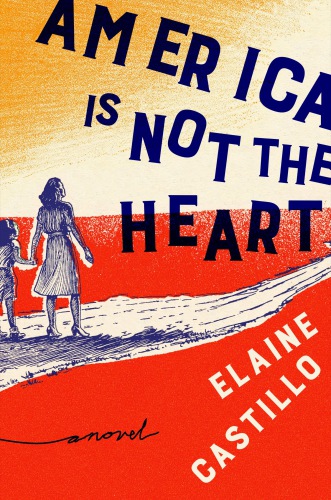
America Is Not the Heart
A Novel
کتاب های مرتبط
- اطلاعات
- نقد و بررسی
- دیدگاه کاربران
نقد و بررسی

Starred review from January 1, 2018
Castillo’s debut, a contemporary saga of an extended Filipino family, is a wonderful, nonpareil novel. It opens with Paz, a long-suffering nurse from Vigan who, having immigrated to Milpitas, Calif., shoulders much of the responsibility for her entire family. Her husband, Pol, a member of the De Vera family in the Philippines and once a successful surgeon, had to flee due to political turmoil and take a job as a security guard in the U.S. When their niece Hero arrives, they take her in, and she leads the rest of the story. Hero is burdened with a disturbing political past that she silently carries with her as she spends her days driving Paz and Pol’s daughter, Roni, to school and to the faith healers that Paz finds to treat Roni’s eczema. Both Hero and Pol struggle to define themselves. While Hero cautiously tries out new friends and lovers of all ilks—most notably a makeup artist named Rosalyn—Pol’s crisis of identity will send him on a journey with Roni that threatens the tenuous American roots Paz has worked so hard to put down for the family. Castillo uses multiple languages—Tagalog, Pangasinan, Ilocano—and the strangest of tenses, hopping around in time and among her characters’ heads; that taking all of these risks pays off is a remarkable feat. The result is a brilliant and intensely moving immigrant tale. Agent: Emma Paterson, Rogers, Coleridge & White.

February 15, 2018
In the 1990s, undocumented immigrant Hero De Vera, disowned by her family for her revolutionary activities, makes her way from the Philippines to Milpitas, CA, seeking refuge with her Aunt Paz, Uncle Pol, and their young daughter, Roni. Paz, a hardworking, exhausted nurse, is the main breadwinner. Pol and Hero were both surgeons in the Philippines. He now has a menial job in the States that barely distracts from his wish to practice medicine again in his home country. Hero's medical career was derailed by the torture she endured in a political prison, where she suffered permanent damage to her hands. Her role in the family, chauffeuring Roni to school and faith healers to cure her extreme eczema, leaves Hero plenty of time for wild partying and a passionate affair with Rosalyn, a makeup expert. This multigenerational family saga teems with endless scenes of exotic foods, multilanguage Philippine dialog, interpersonal clashes, and the ever-present conflicting desire for an adopted country vs. a homeland whose history of chaotic violent politics in the 1980s forced them to flee. VERDICT Castillo's debut novel is particularly relevant in today's toxic political climate. A rich, challenging read.--Beth Andersen, formerly with Ann Arbor Dist. Lib., MI
Copyright 2018 Library Journal, LLC Used with permission.

March 15, 2018
Castillo's debut novel presents a portrait of the Filipino diaspora, told through the lens of a single family.Revolving around Hero de Vera--a former rebel (with the scars to prove it) turned au pair of sorts in Milpitas, California--this is a book about identity but even more about standing up for something larger than oneself. The idea is implicit in that name, Hero, though Castillo pushes against our expectations by bestowing it upon a woman fighting patriarchy. Her employer, after all--her sponsor, really--is her uncle Pol, scion of an influential family. For the most part, Castillo tracks Hero's experiences in the San Francisco Bay Area, highlighting two sustaining relationships: the first with Roni, her uncle's school-age daughter, and the second with Rosalyn, with whom she falls in love. The most important relationship in the book, however, is the one she develops with herself. It's not that Castillo is out to write a novel of transformation; Hero is on a journey, certainly, but it's hard to say, exactly, that the circumstances of her existence change. And yet, this is the point, or one of them, that this sharply rendered work of fiction seeks to address. "She wasn't killed...or didn't kill herself," the character reflects. "Tragedy could be unsensational." Unsensational, yes--much like daily life. Castillo is a vivid writer, and she has a real voice: vernacular and fluid, with a take-no-prisoners edge. At the same time, she complicates her narrative by breaking out of it in a variety of places--both by deftly incorporating languages such as Tagalog and Ilocano and through the use of flashback or backstory, in which we learn what happened to Hero before she left the Philippines. There are also two second-person chapters (the rest is told in third-person) that further complicate the point of view. Here, we encounter Pol's wife, Paz, who untangles the intricate ties of family, and Rosalyn, who explains the vagaries of love. Through it all, we have a sense that what we are reading is part of a larger story that stretches beyond the borders of the book. "As usual," Castillo writes, "you're getting ahead of yourself, but there isn't enough road in the world for how ahead of yourself you need to get."Beautifully written, emotionally complex, and deeply moving, Castillo's novel reminds us both that stories may be all we have to save us and also that this may never be enough.
COPYRIGHT(2018) Kirkus Reviews, ALL RIGHTS RESERVED.

























دیدگاه کاربران